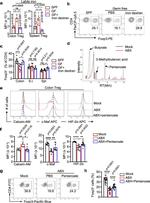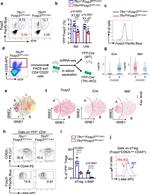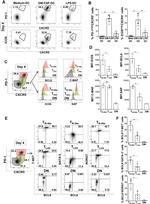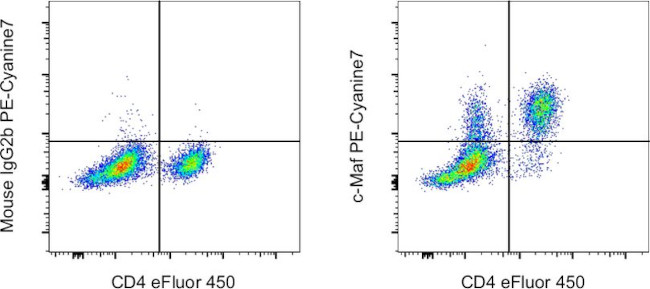Search Thermo Fisher Scientific
Invitrogen
c-MAF Monoclonal Antibody (sym0F1), PE-Cyanine7, eBioscience™
FIGURE: 1 / 4
c-MAF Antibody (25-9855-82) in Flow




Product Details
25-9855-82
Species Reactivity
Published species
Host/Isotype
Recommended Isotype Control
Class
Type
Clone
Immunogen
Conjugate
Excitation/Emission Max
Form
Concentration
Purification
Storage buffer
Contains
Storage conditions
Shipping conditions
RRID
Product Specific Information
Description: The sym0F1 monoclonal antibody reacts with human and mouse c-Maf, a 42 kDa basic leucine zipper transcription factor shown to be involved in the neural, ocular and hematopoietic systems. In hematopoietic cells, it was first shown to be crucial for IL-4 expression in Th2 and was the first transcription factor believed to be Th subset-specific. More recent evidence shows that specific phospho-tyrosine residues lead to upregulation of IL-4. c-Maf has also been shown to be important to differentiation and function in both Th17 and Tfh cells. It drives expression of IL-21 in both cell types, while promoting expression of IL-23R in Th17 and CXCR5 in Tfh as well.
Applications Reported: This sym0F1 antibody has been reported for use in flow cytometric analysis.
Applications Tested: This sym0F1 antibody has been tested by flow cytometric analysis of stimulated mouse splenocytes using the Foxp3/Transcription Factor Staining Buffer Set (Product # 00-5523-00) and protocol. Please refer to "Staining Intracellular Antigens for Flow Cytometry, Protocol B: One step protocol for intracellular (nuclear) proteins" located at www.thermofisher.com/flowprotocols . This may be used at less than or equal to 0.5 µg per test. A test is defined as the amount (µg) of antibody that will stain a cell sample in a final volume of 100 µL. Cell number should be determined empirically but can range from 10^5 to 10^8 cells/test. It is recommended that the antibody be carefully titrated for optimal performance in the assay of interest.
Light sensitivity: This tandem dye is sensitive to photo-induced oxidation. Please protect this vial and stained samples from light.
Fixation: Samples can be stored in IC Fixation Buffer (Product # 00-8222-49) (100 µL of cell sample + 100 µL of IC Fixation Buffer) or 1-step Fix/Lyse Solution (Product # 00-5333-57) for up to 3 days in the dark at 4°C with minimal impact on brightness and FRET efficiency/compensation. Some generalizations regarding fluorophore performance after fixation can be made, but clone specific performance should be determined empirically.
Excitation: 488-561 nm; Emission: 775 nm; Laser: Blue Laser, Green Laser, Yellow-Green Laser.
Target Information
c-maf is the cellular counterpart of oncogenic v-maf that belongs to the family of basic region leucine zipper domain transcription factors. The leucine-zipper domain is involved in the interaction with LRPICD. There are two forms of human c-maf mRNA, c-maf-long and c-maf-short. It is identified in the genome of the acute transforming avian retrovirus AS42. c-maf targets are IL-4 in Th2 cells, the crystalline genes in lens fiber cells, insulin gene in islet, p53 and L7 where it exerts its transcriptional role through binding to a Maf recognition element (MARE). It regulates Th2 differentiation and lineage-specific hematopoiesis. c-maf is a transcription factor for IL-10 gene expression in LPS-activated macrophages. Chromosomal aberration involving maf is found in some forms of multiple myeloma. It is expressed in myeloma cell lines and resting monocytes/macrophages.
For Research Use Only. Not for use in diagnostic procedures. Not for resale without express authorization.
How to use the Panel Builder
Watch the video to learn how to use the Invitrogen Flow Cytometry Panel Builder to build your next flow cytometry panel in 5 easy steps.
Bioinformatics
Protein Aliases: Avian musculoaponeurotic fibrosarcoma (MAF) protooncogene; c-Maf long form; c-maf proto-oncogene; MGC71685; Proto-oncogene c-Maf; T lymphocyte c-maf long form; Transcription factor Maf; v-maf avian musculoaponeurotic fibrosarcoma oncogene homolog; V-maf musculoaponeurotic fibrosarcoma oncogene homolog
Gene Aliases: 2810401A20Rik; A230108G15Rik; AW047063; AYGRP; c-MAF; CCA4; CTRCT21; MAF; Maf2
UniProt ID: (Human) O75444, (Mouse) P54843
Entrez Gene ID: (Human) 4094, (Mouse) 17132

Performance Guarantee
If an Invitrogen™ antibody doesn't perform as described on our website or datasheet,we'll replace the product at no cost to you, or provide you with a credit for a future purchase.*
Learn more
We're here to help
Get expert recommendations for common problems or connect directly with an on staff expert for technical assistance related to applications, equipment and general product use.
Contact tech support

